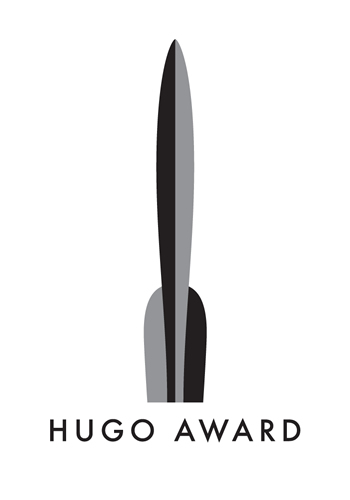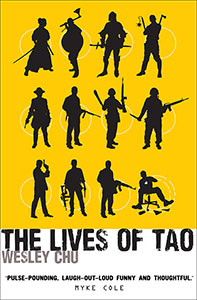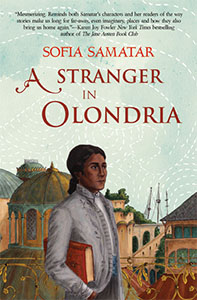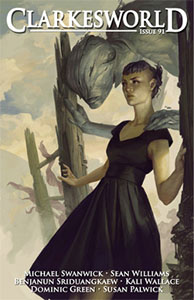 The 2014 Hugo Awards have been awarded at Loncon, but I wanted to share one last round of reviews for the John W. Campbell Award nominees because there’s some really awesome works among them that I want to share with you.
The 2014 Hugo Awards have been awarded at Loncon, but I wanted to share one last round of reviews for the John W. Campbell Award nominees because there’s some really awesome works among them that I want to share with you.
For those unfamiliar with it, the John W. Campbell Award is given to the Best New Writer whose first work appeared within the last two years. (This means that some of the nominees are in the second year of eligibility, whereas other nominees could be nominated again next year.)
Due to time constraints, I mostly limited myself to the works provided by these authors for the Hugo Voters Packet.
5. Wesley Chu – The Lives of Tao
The Lives of Tao is a perfectly nice piece of pulp fiction.
The central conceit is that an alien spacecraft crash landed on Earth several million years ago. These immortal aliens are wraith-like and find the harsh conditions of Earth’s environment debilitating and deadly. Fortunately, they’re able to merge themselves with higher lifeforms, like humans. While merged they can’t necessarily control their host (without great difficulty), but they can communicate with the host, providing them with superhuman insight, knowledge, and experience.
What makes the book effective pulp fiction is the emotionally satisfying life-transformation experienced by the geek-insert protagonist when he’s possessed by one of these aliens: From an unmotivated blob of nerd fat, he ends up becoming a fairly competent secret agent. Feel-good moments of engaging character development are intermixed effectively with a sequence of well-paced action sequences which slowly reveal more and more of the mythos which Chu has created.
 What makes the book fairly forgettable, however, is the general lack of craft displayed in its execution. (As seen, for example, in the sloppy and repetitive prose.) What hurts the book particularly is the lack of real thought given to the world being built: I’m generally skeptical of “every important person in history was actually an alien/vampire/telepath” SF stories, but Chu actually carries off the broad strokes of that conceit better than most. Where he falls down is failing to really appreciate scale and impact: You’ve got a bunch of aliens who can’t talk to each other for millions of years until humans evolve because only humans have vocal cords. (Apparently the aliens forgot how writing works.) Then they all sit around not creating technological societies for several million years because… Umm… Well, actually, I don’t know. Historically that didn’t happen because it took human culture a long time to figure out that sort of thing was possible. But when you’ve got super-intelligent aliens guiding our actions who already know how technological societies work, it feels like it should have happened a lot sooner. It also feels like the holy books in this universe (all written by alien-possessed humans) should be filled with useful advice like “boil your water” and “wash your hands”, instead of random bullshit like “the flesh of a woman during her menstrual cycle is unclean”.
What makes the book fairly forgettable, however, is the general lack of craft displayed in its execution. (As seen, for example, in the sloppy and repetitive prose.) What hurts the book particularly is the lack of real thought given to the world being built: I’m generally skeptical of “every important person in history was actually an alien/vampire/telepath” SF stories, but Chu actually carries off the broad strokes of that conceit better than most. Where he falls down is failing to really appreciate scale and impact: You’ve got a bunch of aliens who can’t talk to each other for millions of years until humans evolve because only humans have vocal cords. (Apparently the aliens forgot how writing works.) Then they all sit around not creating technological societies for several million years because… Umm… Well, actually, I don’t know. Historically that didn’t happen because it took human culture a long time to figure out that sort of thing was possible. But when you’ve got super-intelligent aliens guiding our actions who already know how technological societies work, it feels like it should have happened a lot sooner. It also feels like the holy books in this universe (all written by alien-possessed humans) should be filled with useful advice like “boil your water” and “wash your hands”, instead of random bullshit like “the flesh of a woman during her menstrual cycle is unclean”.
If the aliens had crash-landed in, say, 1453 AD (or even 157 BC) it would have all made a lot more sense. But it feels like Chu really liked the idea of his aliens remembering the time that they inhabited dinosaurs and he just kind of latched onto that image without really thinking through any of the consequences.
In any case, I don’t want to be too hard on The Lives of Tao. I’m actually being very sincere when I say that it’s enjoyable pulp fiction. In fact, I enjoyed it enough that I’ve got the sequel (The Deaths of Tao) tucked away on my reading list. If you’re looking for some entertaining fiction, this is definitely something you should consider. It’s just that Chu is so clearly outclassed by every other nominee for this award that his placement at the bottom of the list is fairly self-evident.
Grade: D
4. Sofia Samatar – A Stranger in Olondria
I’ll be honest in saying that Samatar’s A Stranger in Olondria faced an uphill slog for me because the particular type of fiction she’s aiming to create is not one that I generally find palatable. (It’s not really a specific sub-genre; it’s just the quasi-literary feel of the story.) If your mileage varies, I suspect you could easily love this book. (And clearly the mileage varied for a lot of people because Samatar won the award this year.)
I suspect this book also fared poorly with me because I had so recently read Gene Wolfe’s Book of the New Sun: A Strange in Olondria is trying to accomplish a lot of the same things that Wolfe did (albeit in a classic fantasy setting instead of a science fantasy setting), but Wolfe just clearly does it better in every single possible way, whether you’re talking about quality of prose; depth of character; pacing; creativity; impact; etc.
 More generally, I knew that A Stranger in Olondria had problems when I saw that I was 20% of the way through the book and nothing had happened: The author had guided us through a paint-by-numbers coming-of-age story of a young boy who really loves books (yawn!), but nothing had actually happened in the course of that story. It was just generic events being reported generically. I decided that I would give the book until 25% completion to actually do something (a luxury I almost certainly would not have given it if not for the award nomination), and it just barely managed to accomplish that by launching the actual plot of the book just before hitting that mark: The character is possessed by a ghost and has to figure out how to get rid of it.
More generally, I knew that A Stranger in Olondria had problems when I saw that I was 20% of the way through the book and nothing had happened: The author had guided us through a paint-by-numbers coming-of-age story of a young boy who really loves books (yawn!), but nothing had actually happened in the course of that story. It was just generic events being reported generically. I decided that I would give the book until 25% completion to actually do something (a luxury I almost certainly would not have given it if not for the award nomination), and it just barely managed to accomplish that by launching the actual plot of the book just before hitting that mark: The character is possessed by a ghost and has to figure out how to get rid of it.
At this point there’s a short flurry of activity and then… nothing happens again. For a very long time. There’s another lengthy gap (this time to the 50% mark) and then there’s another flurry of activity and then… Yeah. The gaps between points of interest shorten and eventually the last tenth or so of the book manages to get some momentum going. But up until that point reading the book felt like watching a drunk lurch somewhat haphazardly down the street.
Grade: C+
3. Benjanun Sriduangkaew – Stories of the Hegemony
Ranking the top 3 positions on my ballot for the John W. Campbell Award was actually quite difficult for me. Sriduangkaew dropped to the third position primarily because she’s in her first year of eligibility, whereas the other two authors were in their final year of eligibility. I suspect she’s likely to get nominated again next year with a more robust body of work.
 Sriduangkaew’s work to date has primarily orbited a sequence of stories set in or around the Hegemony, a future society in which humanity’s mind has become so wired up and interconnected that the government is able to retroactively edit not only the records of society but also the memories of society. (If that sounds dystopic to you, that’s because it is.) What makes these stories particularly compelling is that Sriduangkaew uses the wide canopy of the Hegemony to tell a vast variety of stories: A souped up secret agent who can edit memories to insert herself into deep cover situations. A common person struggling to survive. A scientist enmeshed in the maintenance of the system. A resistance fighter trying to turn the empire’s system against itself. Interesting characters and fascinating ideas mix freely with beautiful imagery to create captivating stories.
Sriduangkaew’s work to date has primarily orbited a sequence of stories set in or around the Hegemony, a future society in which humanity’s mind has become so wired up and interconnected that the government is able to retroactively edit not only the records of society but also the memories of society. (If that sounds dystopic to you, that’s because it is.) What makes these stories particularly compelling is that Sriduangkaew uses the wide canopy of the Hegemony to tell a vast variety of stories: A souped up secret agent who can edit memories to insert herself into deep cover situations. A common person struggling to survive. A scientist enmeshed in the maintenance of the system. A resistance fighter trying to turn the empire’s system against itself. Interesting characters and fascinating ideas mix freely with beautiful imagery to create captivating stories.
As some small indication of her quality, I will note that Sriduangkaew was the only Hugo-nominated author I read whose other work I immediately sought out and read. I heartily suggest you do the same. Conveniently, many of her stories can be found on (or linked from) her website. For her Hegemony stories specifically, you can check out (in the order I recommend reading them):
Also available are:
- “When We Harvested the Nacre-Rice” (in Solaris Rising 3)
- “Elision” (in La Femme)











